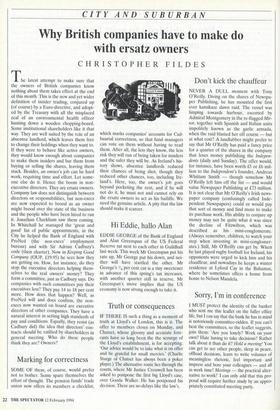CITY AND SUBURBAN
Why British companies have to make do with ersatz owners
CHRISTOPHER FILDES
The latest attempt to make sure that the owners of British companies know nothing about them takes effect at the end of this month. This is the new and yet wider definition of insider trading, conjured up (of course) by a Euro-directive, and adopt- ed by the Treasury with all the misplaced zeal of an environmental health officer hunting down a wooden chopping-board. Some institutional shareholders like it that way. They are well suited by the role of an absentee landlord, which leaves them free to change their holdings when they want to. If they were to behave like active owners, they would know enough about companies to make them insiders and bar them from buying or selling the shares, leaving them stuck. Besides, an owner's job can be hard work, requiring time and effort. Let some- one else do it. Hence the boom in non- executive directors. They are ersatz owners. Company law does not distinguish between directors or responsibilities, but non-execs are now expected to brood as an owner might brood over the state of the business and the people who have been hired to run it. Jonathan Charkham saw them coming. In Whitehall he managed the 'great and good' list of public appointments, in the City he helped the Bank of England with ProNed (the non-execs' employment bureau) and with Sir Adrian Cadbury's code (their charter). Now in Keeping Good Company (OUP, £19.95) he sees how they are getting on. How, for instance, do they stop the executive directors helping them- selves to the real owners' money? They form a committee, just as Cadbury says. Do companies with such committees pay their executives less? They pay 14 to 18 per cent more. How does that happen? Well, as ProNed will and does confirm, the non- execs now wanted on board are executive directors of other companies. They have a natural interest in setting high standards of pay and conditions. Equally, they resist (as Cadbury did) the idea that directors' con- tracts should be ratified by shareholders in general meeting. Who do these people think they are? Owners?


















































 Previous page
Previous page